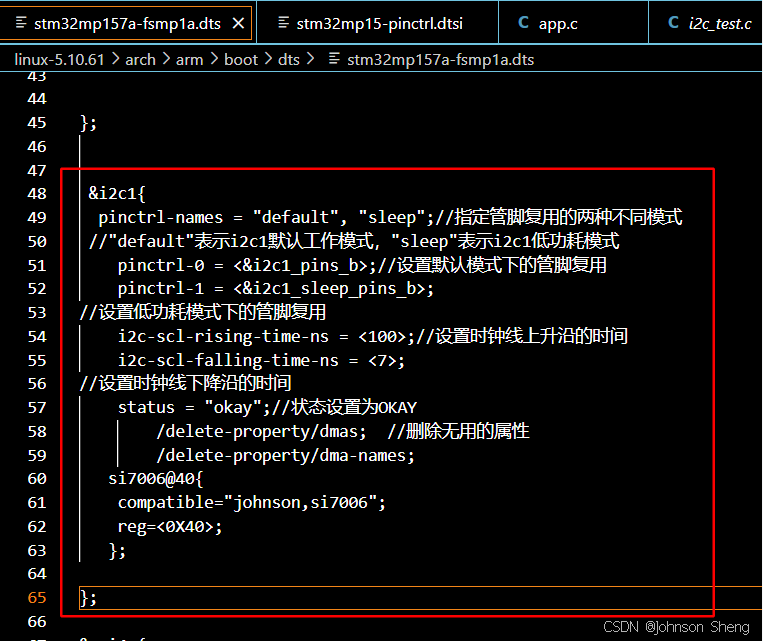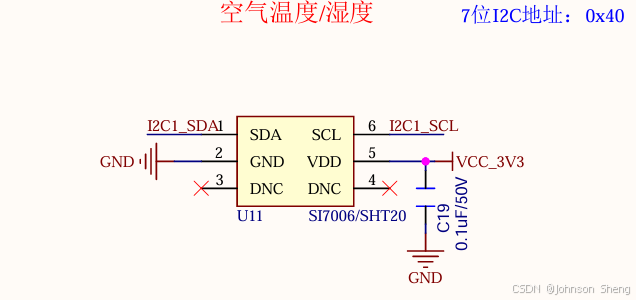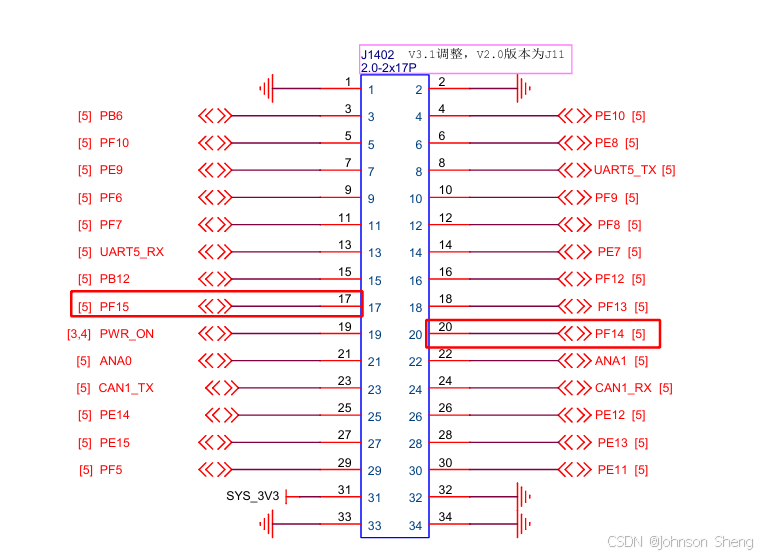由于I2C总线驱动为Linux内核自带的总线驱动,在一个新的板子上可能由于不同的定义与芯片原厂定义的I2C管脚有所不同,这时就需要开发人员对设备树信息及内核驱动进行更新。
原理图可知,I2C的SCL对应PF14,SDA对应PF15
在Linux内核中,arch/arm/boot/dts/ 设备树文件 --> stm32mp157a-fsmp1a.dts,I2C对应的GPIO复用信息 --> stm32mp15-pinctrl.dtsi。

#include <linux/init.h> // 包含内核初始化相关的头文件
#include <linux/module.h> // 包含内核模块相关的头文件
#include <linux/of.h> // 包含设备树操作相关的头文件
#include <linux/gpio.h> // 包含 GPIO 操作相关的头文件
#include <linux/of_gpio.h> // 包含设备树 GPIO 相关的头文件
#include <linux/fs.h> // 包含文件操作相关的头文件
#include <linux/uaccess.h> // 包含用户空间访问内核空间相关的头文件
#include <linux/device.h> // 包含设备相关的头文件
#include <linux/i2c.h> // 包含 I2C 相关的头文件
#include "i2c_test.h" // 包含自定义头文件
//创建设备号
static int major;
//创建类
static struct class *cls;
//创建设备
static struct device *device;
//创建i2c_client
static struct i2c_client *client;
//保存字符设备数据
static char i2c_buf[100];
//获取温湿度数据
int get_hum_tem(int reg)
{
int ret = 0;
char r_buf = reg;
short value;
struct i2c_msg r_msg[] ={
[0] = {
.addr = client->addr,
.flags = 0,
.len = 1,
.buf = &r_buf,
},
[1] = {
.addr = client->addr,
.flags = 1,
.len = 2,
.buf = (u8 *)&value,
},
};
//发送读取温湿度数据的命令
ret = i2c_transfer(client->adapter, r_msg, 2);
if(ret != 2)
{
printk("i2c_transfer failed\n");
return ret;
}
return value;
} //end of get_hum_tem
static int led_open(struct inode *inode, struct file *file)
{
unsigned int cmajor;
//保存次设备号
cmajor = iminor(inode);
//将次设备号保存到file结构体的private_data中
file->private_data = (void *)cmajor;
printk("led_open\n");
return 0;
}
static int led_close(struct inode *inode, struct file *file)
{
printk("led_close\n");
return 0;
}
static int led_read(struct file *file, char __user *buf, size_t count, loff_t *ppos)
{
unsigned int ret;
//从内核空间读取数据到用户空间,如果读取数据的长度大于i2c_buf的长度,按照最大长度读取
if(count > sizeof(i2c_buf))
{
count = sizeof(i2c_buf);
}
ret = copy_to_user(buf, i2c_buf, count);
if(ret < 0)
{
printk("copy_to_user failed\n");
return -1;
}
printk("led_read\n");
return 0;
}
static int led_write(struct file *file, const char __user *buf, size_t count, loff_t *ppos)
{
unsigned int ret;
//将用户空间的数据拷贝到内核空间,如果传输数据的长度大于i2c_buf的长度,按照最大长度传输
if (count > sizeof(i2c_buf))
{
count = sizeof(i2c_buf);
}
ret = copy_from_user(i2c_buf, buf, count);
if (ret < 0)
{
printk("copy_from_user failed\n");
return -1;
}
printk("led_write\n");
return 0;
}
static long led_ioctl(struct file *file, unsigned int cmd, unsigned long arg)
{
int hum = 0, tem = 0;
//写入用户空间
switch(cmd)
{
case GET_HUM:
hum = get_hum_tem(0xE5);
copy_to_user((int *)arg, &hum, 4);
break;
case GET_TEM:
tem = get_hum_tem(0xE3);
copy_to_user((int *)arg, &tem, 4);
break;
default:
break;
}
printk("led_ioctl\n");
return 0;
}
//定义file_operations结构体
struct file_operations fops = {
.owner = THIS_MODULE,
.open = led_open,
.release = led_close,
.read = led_read,
.write = led_write,
.unlocked_ioctl = led_ioctl,
};
//编写i2c设备驱动
static int myi2c_probe(struct i2c_client *pdev, const struct i2c_device_id *id)
{
printk("myi2c_probe\n");
client = pdev;
//1.创建设备号
major = register_chrdev(0, "myi2c", &fops);
if (major < 0)
{
printk("register_chrdev failed\n");
return -1;
}
//2.创建类
cls = class_create(THIS_MODULE, "myi2c");
if (IS_ERR(cls))
{
printk("class_create failed\n");
unregister_chrdev(major, "myi2c");
return -1;
}
//3.创建设备
device = device_create(cls, NULL, MKDEV(major, 0), NULL, "myi2c");
if (IS_ERR(device))
{
printk("device_create failed\n");
class_destroy(cls);
unregister_chrdev(major, "myi2c");
return -1;
}
return 0;
}
static int myi2c_remove(struct i2c_client *pdev)
{
printk("myi2c_remove\n");
device_destroy(cls, MKDEV(major, 0));
class_destroy(cls);
unregister_chrdev(major, "myi2c");
return 0;
}
static const struct of_device_id myplatform_test_match_table[] = {
{ .compatible = "johnson,si7006", },
{ /* sentinel */ }
};
struct i2c_driver myi2c_driver = {
.probe = myi2c_probe,
.remove = myi2c_remove,
.driver = {
.name = "myi2c_slave",
.of_match_table = myplatform_test_match_table,
},
};
//一键注册宏定义
module_i2c_driver(myi2c_driver);
MODULE_LICENSE("GPL");头文件
#ifndef __I2CTEST_H__
#define __I2CTEST_H__
#define GET_HUM _IOR('i', 1, int)
#define GET_TEM _IOR('i', 0, int)
#endif应用程序 --> 实现通过I2C获取温湿度数据
#include <stdio.h>
#include <fcntl.h>
#include <unistd.h>
#include <sys/ioctl.h>
#include <arpa/inet.h>
#include "i2c_test.h"
int main()
{
int hum = 0, tem = 0;
float hum1, tem1; // 保存计算完毕后的温湿度数据
int fd = 0;
//打开设备文件
fd = open("/dev/myi2c", O_RDWR);
if (fd < 0)
{
printf("open failed\n");
return -1;
}
//读取数据
while(1)
{
ioctl(fd, GET_HUM, &hum);
ioctl(fd, GET_TEM, &tem);
//字节序转换
hum = ntohs(hum);
tem = ntohs(tem);
hum1 = (float)hum * 125 / 65536 - 6;
tem1 = tem * 175.72 / 65536 - 46.85;
printf("hum = %f, tem = %f\n", hum1, tem1);
sleep(1);
}
//关闭设备文件
close(fd);
return 0;
}


